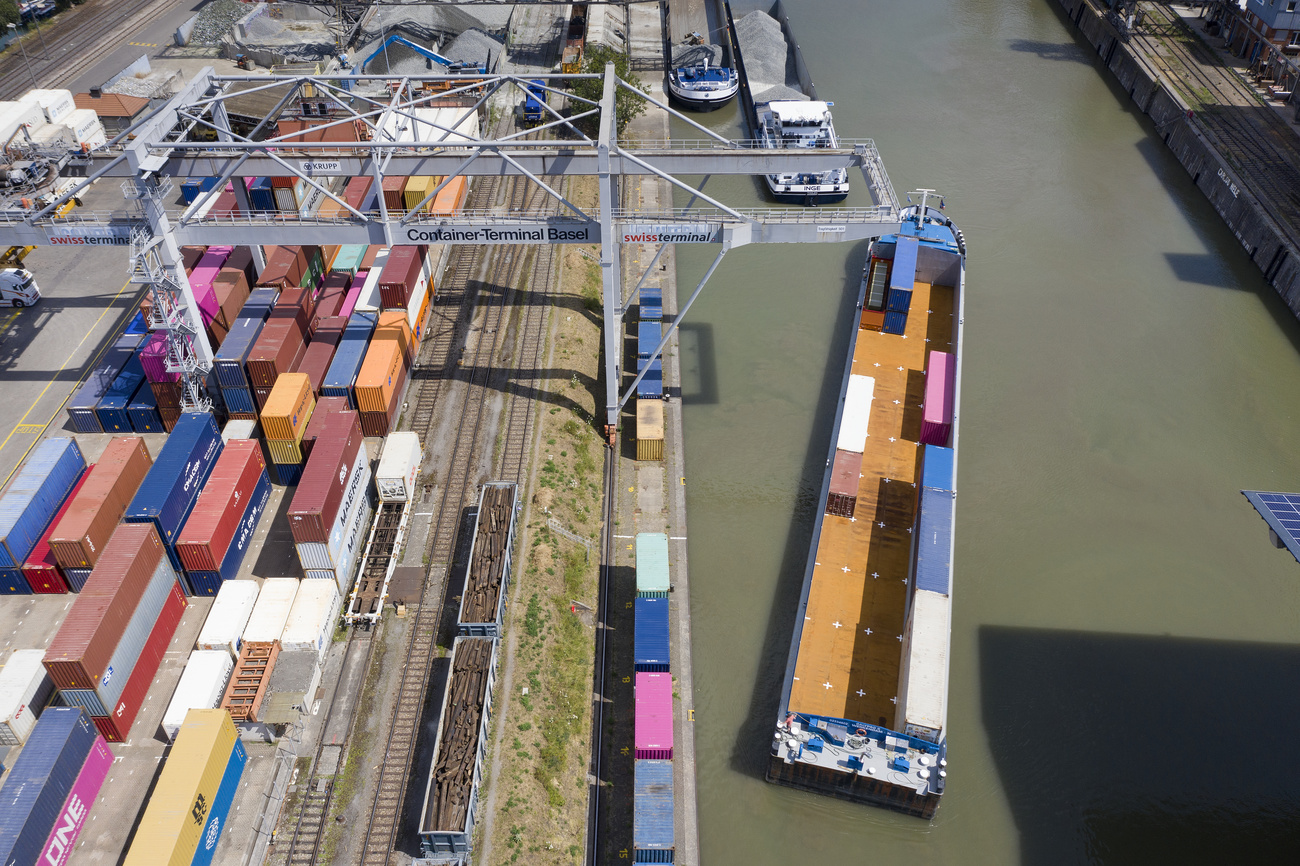‘Uncertainty is the worst enemy of international trade’
The return of protectionism, the renegotiation of relations with the European Union, and a cooling Chinese market: against a backdrop of geopolitical turmoil, with whom and how should Switzerland trade? Our Let's Talk debate tackles this question.
>> Watch the full debate above and turn on closed captioning (CC) for subtitles in your preferred language.
The Swiss economy generates more than one in three Swiss francs abroad. Foreign trade is one of the keys to the Alpine nation’s success – but it also makes it vulnerable to geopolitical upheavals.
To maintain its prosperity, Switzerland therefore relies on free trade agreements: it has signed 35 of them with 45 countries or groups of countries. “These agreements are vital for a small country like Switzerland, whose domestic market is small. It is in Switzerland’s interest to diversify its trading partners,” says Christine Kaddous, a professor of law at the University of Geneva, in our Let’s Talk debate.
Guests of the Let’s Talk debate also discussed trade with the European Union. The debate took place a few weeks before Switzerland and the EU announced in late December that they had concluded years-long negotiations on a package of deals governing future bilateral relations.
The last free trade agreement signed by Switzerland, alongside the other members of the European Free Trade Association (EFTA), was with India in March 2024. Cédric Dupont, a professor of international relations at the Geneva Graduate Institute, considers it a success. “We are the first country after Australia to have succeeded in signing such an agreement with India,” he says.
>> Read our analysis on how Switzerland profits from free trade deals:

More
Who benefits from free trade agreements with Switzerland?
“This will make it easier for Swiss companies to gain access to the Indian market,” says Philippe Cordonier, director in French-speaking Switzerland of Swissmem, the umbrella organisation for the machinery, electrical equipment and metals industry. He points out that India may be a minor trading partner for Switzerland at the moment, but it is a market with strong growth potential. In general, Cordonier sees this network of free trade agreements as a real competitive advantage for Switzerland over countries that don’t have one.
Lakshmi Sundaram, the delegate for the United Kingdom from the Organisation of the Swiss Abroad (OSA), takes a more nuanced view of free trade agreements. Since Brexit, her country of residence has also been banking on concluding trade agreements with its partners. “However, the benefits pale in comparison with the negative effects of leaving the EU, which we feel on a daily basis,” she says.
The next agreement on the agenda could be with the Mercosur countries (Brazil, Argentina, Uruguay and Paraguay). However, discussions have been dragging on for several years. Kaddous believes that the deadlock will not be broken any time soon: “On the one hand, there is a great deal of resistance from the farming community,” she says. “On the other, the economy sees it as a way of further diversifying Switzerland’s trade relations.”
In Dupont’s view, the main obstacle to a successful agreement with South America are environmental groups that fear the negative environmental impact of such a partnership. “On the other hand, the Swiss negotiators have taken the concerns of farmers seriously, and they don’t seem to be worried,” he says.
‘Protectionism is a lose-lose proposition’
The Swiss economy also has to contend with the resurgence of protectionism in international relations. This trend is likely to be reinforced with the return of US president-elect Donald Trump to the White House, who has already promised to raise tariffs. “For the United States, this amounts to shooting itself in the foot. Donald Trump is not in the realm of economics but of political fantasy,” says Dupont.
“Protectionism is a lose-lose proposition,” says Cordonier, adding he fears Trump’s unpredictability, which is bad for industry. However, he sees an opportunity for Swiss companies: “They can help Americans revive certain industries by selling them machinery, but also by helping them to better train their staff.”
However, it is not in Switzerland’s interest to adopt protectionist measures to shield its industry, according to the Let’s Talk guests. “Re-industrialisation is making a comeback in some major markets, such as the United States, the European Union and India. However, it is a policy that has been largely discredited,” says Dupont.
It is an opinion shared by Kaddous, who believes that Switzerland’s liberal approach is advantageous for a small country. She is also against state support for any particular branch of industry. However, to support the Swiss steelworks sector, which is under pressure and laying off large numbers of workers, she believes that granting them rebates on electricity, as proposed by a parliamentary committee, is an interesting approach.
>>What do you think? Join our debate below:
More
Edited by Samuel Jaberg. Adapted from French by DeepL/ac/gw.











You can find an overview of ongoing debates with our journalists here . Please join us!
If you want to start a conversation about a topic raised in this article or want to report factual errors, email us at english@swissinfo.ch.